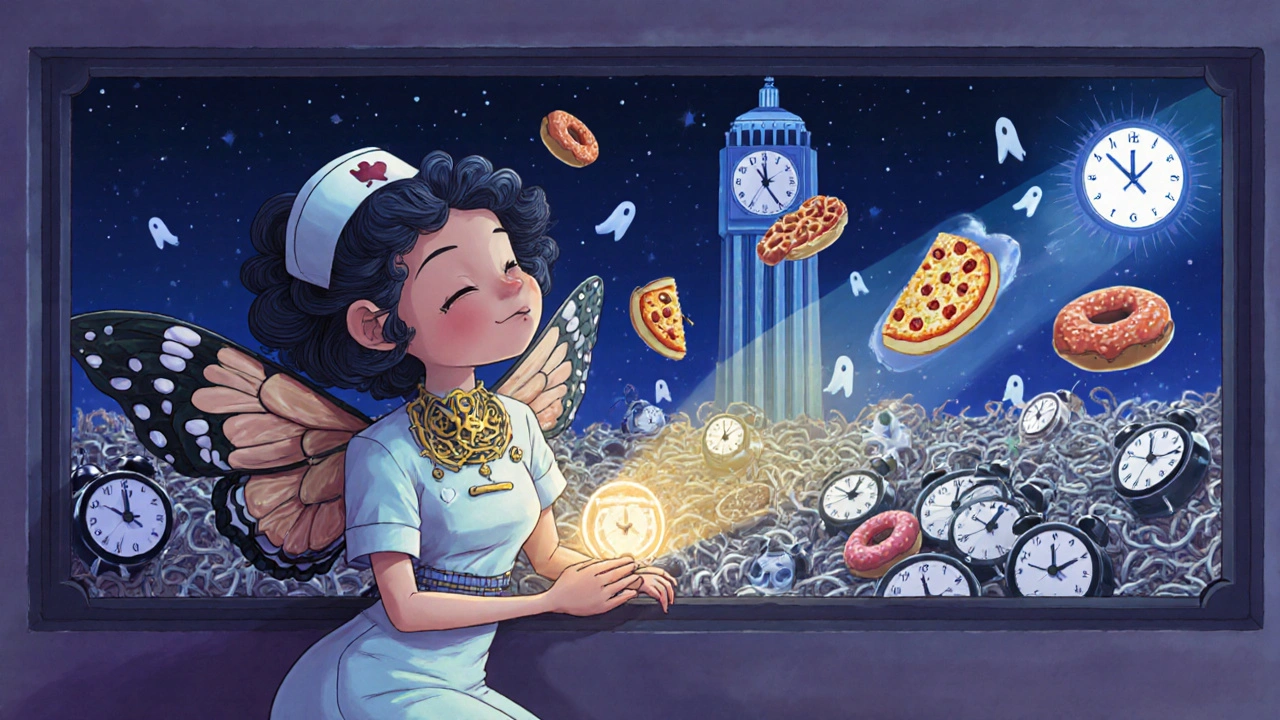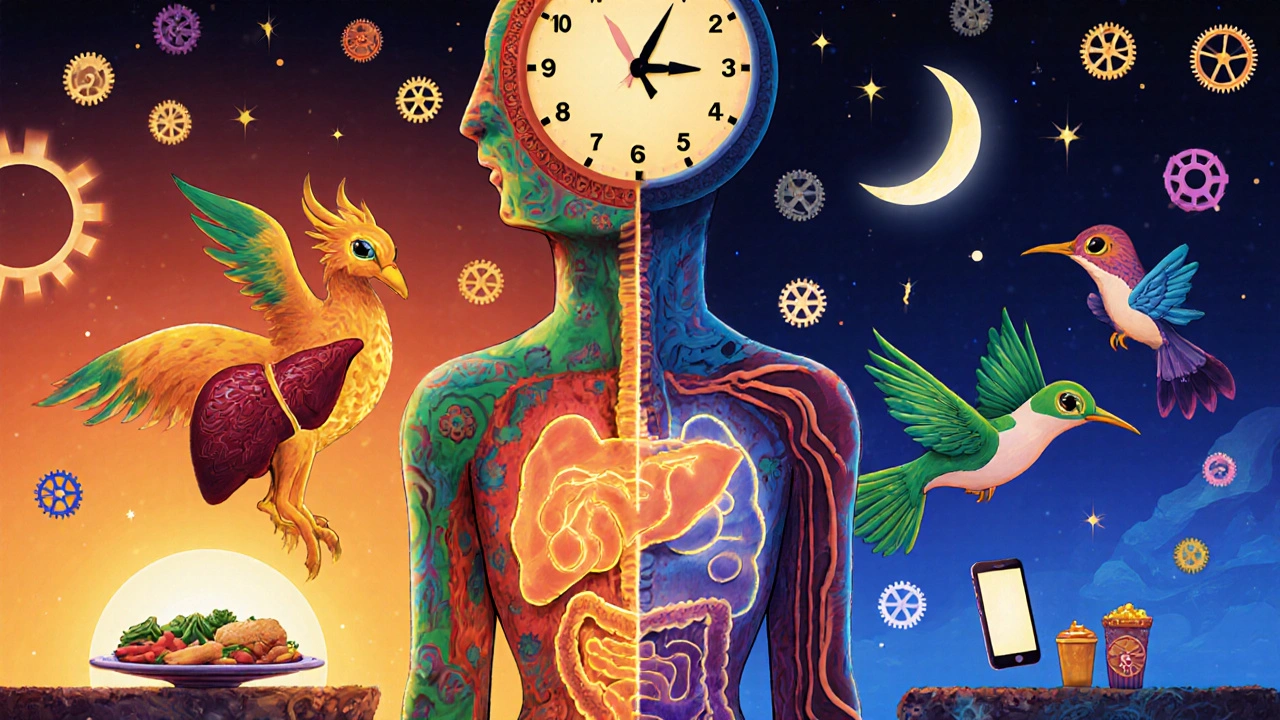Most people think weight gain is just about eating too much or not exercising enough. But what if the real issue isn’t your plate-it’s your sleep schedule? If you’ve tried cutting calories, hitting the gym, and still can’t lose weight, the problem might not be willpower. It could be your body’s internal clock.
The Clock Inside You
Every cell in your body runs on a 24-hour rhythm called the circadian clock. It’s not just about when you feel tired or awake. This internal timer controls your metabolism, hormone levels, digestion, and even how your body stores fat. The master clock sits in your brain, but every organ-your liver, pancreas, fat tissue-has its own clock synced to it. When these clocks are in sync with daylight and nighttime, everything works smoothly. But when they’re out of step, your body starts to malfunction.Think of it like a factory. If the assembly line runs at night when everyone’s asleep, parts get mixed up, waste builds up, and the final product is defective. That’s what happens when you eat late, sleep irregularly, or work nights. Your body thinks it’s daytime when it’s actually nighttime. And your metabolism? It gets confused.
How Late Nights Lead to Extra Pounds
Research shows that people who regularly work nights or stay up late gain weight faster-even if they eat the same amount as someone on a normal schedule. A 2014 study found that night shift workers burned about 55 fewer calories per day than day workers. That’s the equivalent of skipping a small snack. Sounds small? Over a year, that adds up to more than 7 pounds of extra weight.But here’s the real kicker: sleep loss doesn’t just slow down your metabolism. It makes you hungrier. When you get less than 6 hours of sleep, your body produces more ghrelin-the hunger hormone-and less leptin, the signal that tells you you’re full. One study showed that after just four nights of only 4 hours of sleep, people craved high-carb snacks 33% more. Their brains lit up like they were looking at dessert in a bakery window-even when they weren’t actually hungry.
And it’s not just about quantity. Timing matters. Eating dinner at 11 p.m. is metabolically different than eating it at 7 p.m. Your body expects food during daylight. When you eat at night, your liver and pancreas aren’t ready. Blood sugar spikes higher, insulin doesn’t work as well, and fat storage ramps up. Studies show that late-night eating can reduce insulin sensitivity by up to 25%. That means your body can’t process sugar properly-and stores it as fat instead.
Why Diets Often Fail (Even When You’re Doing Everything Right)
You might be eating clean, counting calories, and still gaining weight. Why? Because your circadian rhythm is out of sync. Traditional weight loss advice ignores timing. But science now shows that when you eat is as important as what you eat.One landmark study from the Salk Institute found that overweight adults who ate all their meals within a 10-hour window during daylight hours lost 3-5% of their body weight in 12 weeks-without changing what they ate. They didn’t count calories. They didn’t cut carbs. They just stopped eating after 8 p.m. and didn’t start until 8 a.m. The result? Less hunger, better sleep, and steady weight loss.
Another study tracked people using a sleep app who followed time-restricted eating. Those who aligned their meals with their natural rhythm lost 7.1 pounds more than those who didn’t. The key wasn’t fasting longer-it was eating during the hours your body is designed to digest food.
For night shift workers, this gets tricky. But even they can benefit. One hospital system helped night nurses eat their main meal at noon and have a light snack at 2 a.m. instead of a full dinner. Within months, weight gain dropped by 42%. The fix wasn’t medication or surgery. It was timing.

Chronotypes Matter More Than You Think
Not everyone is the same. Some people are early birds-naturally awake at 5 a.m. Others are night owls, feeling alert at midnight. This is your chronotype. And it affects how well time-restricted eating works for you.If you’re a morning person, eating between 7 a.m. and 5 p.m. gives you the best results. If you’re a night owl, pushing your window to 10 a.m. to 8 p.m. works better. A 2020 trial found morning types lost 23% more weight with an early eating window than night owls did. But when night owls followed a later window, their results improved dramatically.
The trick? Don’t force yourself into someone else’s schedule. Match your eating window to your natural rhythm. You can find your chronotype with a simple 19-question test called the Horne-Östberg Morningness-Eveningness Questionnaire. It’s free online. Knowing your type isn’t just helpful-it’s essential for long-term success.
Real People, Real Results
On Reddit’s r/ShiftWork subreddit, 78% of over 1,200 people said they gained weight after starting night shifts. Many described the same pattern: “I ate the same food, but I couldn’t stop snacking at 3 a.m.” One nurse gained 35 pounds in her first year. She didn’t binge. She just ate when her body told her to-because her clock was broken.But then, some changed. One person started eating only between 8 a.m. and 6 p.m. No snacks after dinner. No midnight cereal. Within three months, she lost 12 pounds. “I didn’t feel deprived,” she wrote. “I just stopped fighting my body.”
Others tried apps that track sleep and eating patterns. One user gave up after two years. “The science makes sense,” they wrote, “but my job changes every week. I can’t stick to a schedule.” That’s the hard truth. Modern life fights against our biology. But even small changes help.

What You Can Do Today
You don’t need to quit your job or live like a monk. Start with one small shift:- Eat your last meal at least 3 hours before bed. If you sleep at 1 a.m., finish eating by 10 p.m.
- Avoid bright lights-especially blue light from phones-after 9 p.m. Use night mode or red bulbs.
- Try eating all your food within a 10-hour window. Start with 12 hours if 10 feels too hard. Cut 30 minutes each week.
- Get sunlight within 30 minutes of waking. Even 10 minutes outside helps reset your clock.
- If you work nights, eat your main meal during your “day” (even if it’s at noon) and keep nighttime snacks light and protein-heavy.
Don’t expect overnight results. It takes 2-4 weeks for your body to adjust. But once it does, hunger pangs at midnight fade. Sleep gets deeper. Energy rises. And the scale? It starts moving.
The Bigger Picture
This isn’t just about losing weight. It’s about preventing diabetes, heart disease, and fatty liver-all linked to chronic circadian disruption. The World Health Organization now says circadian misalignment could be responsible for 5-8% of global obesity cases. That’s millions of people who might lose weight without dieting, if only their schedules lined up with their biology.Companies are starting to notice. Kaiser Permanente now gives night shift workers light therapy and meal timing guides. Fitbit’s latest sleep trackers now measure circadian alignment and predict weight changes with 18% accuracy. The FDA is even requiring drug trials for obesity to test whether timing affects results.
The science is clear: your body was never meant to eat at midnight, sleep in the day, and stare at screens under artificial light. We’ve rewired our lives, but our genes haven’t caught up. The solution isn’t more willpower. It’s better timing.
Can lack of sleep make you gain weight even if you eat healthy?
Yes. Even if you eat healthy foods, not getting enough sleep increases hunger hormones and reduces your body’s ability to process sugar. Studies show people who sleep less than 6 hours a night consume an extra 250+ calories daily-mostly from carbs and fats-without realizing it. This creates a calorie surplus that leads to weight gain, even with a clean diet.
Does eating late at night cause weight gain?
It’s not the food itself-it’s the timing. Your body’s metabolism slows down at night. Eating late means your liver and pancreas aren’t primed to process food efficiently. This leads to higher blood sugar spikes, reduced insulin sensitivity, and more fat storage. Studies show that late-night meals can reduce the thermic effect of food by up to 17%, meaning your body burns fewer calories digesting the same meal compared to eating it earlier.
What is time-restricted eating, and does it help with weight loss?
Time-restricted eating (TRE) means limiting your daily food intake to a specific window-usually 8 to 10 hours-during daylight hours. For example, eating only between 8 a.m. and 6 p.m. Research shows TRE leads to 3-5% body weight loss in 12 weeks, even without cutting calories. It works by aligning food intake with your body’s natural metabolic rhythm, improving insulin response and reducing nighttime cravings.
Are night shift workers more likely to gain weight?
Yes. Around 20% of the global workforce works nights or irregular shifts, and studies show they gain weight faster than day workers-even when eating the same amount. Their circadian rhythm is constantly disrupted, leading to lower energy expenditure, poor glucose control, and increased appetite. One study found night shift workers gained 2.5 kg more over two years than day workers with similar diets.
Can you fix your circadian rhythm if you’ve been sleeping wrong for years?
Yes, but it takes consistency. Start by waking up at the same time every day-even on weekends-and get sunlight within 30 minutes of waking. Avoid bright lights after 9 p.m. Gradually shift your eating window earlier by 30-60 minutes each week. Most people see improvements in sleep and appetite within 2-4 weeks. It’s not about perfection-it’s about moving your habits closer to your body’s natural rhythm.

Kihya Beitz
November 14, 2025 AT 12:21Oh wow, another ‘just sleep better’ miracle fix. Because clearly, the real problem isn’t corporate greed, 3 jobs, or living in a 900 sq ft apartment with a snoring roommate. Nope. Just stop eating after 8 p.m. like it’s 1955 and we all have a nanny who tucks us in. 🙄
Jennifer Walton
November 14, 2025 AT 14:17The body is a rhythm. We are noise.
Aidan McCord-Amasis
November 15, 2025 AT 11:56Y’all are still arguing about dinner times while your boss makes you work 12-hour shifts? 😂
Adam Dille
November 15, 2025 AT 19:36I tried the 10-hour window and honestly? My cravings dropped. Not because I’m disciplined, but because my body stopped screaming for sugar at 2 a.m. 🙏 I still eat pizza, but now it’s at 6 p.m. and I don’t feel like a zombie afterward. Just saying.
Katie Baker
November 16, 2025 AT 07:02This actually made me cry a little. I’ve been working nights for 5 years and thought I was just ‘bad at dieting.’ Turns out my body was just begging for help. Started eating lunch at noon and having a protein bar at 2 a.m. instead of chips. Lost 8 lbs in 6 weeks. No magic. Just biology. 💛
Hollis Hollywood
November 18, 2025 AT 02:26I’ve been thinking about this for weeks now. It’s not just about food or sleep-it’s about the entire structure of modern life. We’ve built a world that demands constant availability, constant light, constant productivity. And then we’re shocked when our bodies break down? We’re not lazy. We’re out of sync. The science here isn’t just about weight-it’s about dignity. Our biology didn’t evolve for 3 a.m. Zoom calls and fluorescent office lights. We’re asking humans to be machines, and then blaming them for failing. I don’t think we’ve even begun to reckon with that.
Edward Ward
November 18, 2025 AT 16:36Wait-so if you’re a night owl, you’re supposed to eat until 8 p.m.? But what if you don’t get off work until 9? And your shift ends at 11? And your kid wakes up at 1 a.m.? And your partner is asleep? And your fridge is empty except for leftover lasagna? Do you just… starve? Or do you eat the lasagna and feel guilty? This advice feels great on paper, but for people living in real life-with real jobs, real kids, real chaos-it’s like being told to ‘just breathe’ during a panic attack. I’m not saying the science is wrong. I’m saying the application is elitist. And we need to talk about that.
Andrew Eppich
November 20, 2025 AT 02:56It is not complicated. Eat during daylight. Sleep at night. This is not a novel concept. It is biological law. To suggest otherwise is to deny evolution. The fact that people require a 2,000-word article to understand this speaks to the depth of our cultural decay.
Jessica Chambers
November 20, 2025 AT 18:10So… I’m a night owl who eats at 9 p.m. and I lost 10 lbs by just not snacking after dinner? And now I’m supposed to feel guilty for not waking up at 5 a.m. to ‘reset my clock’? 😒